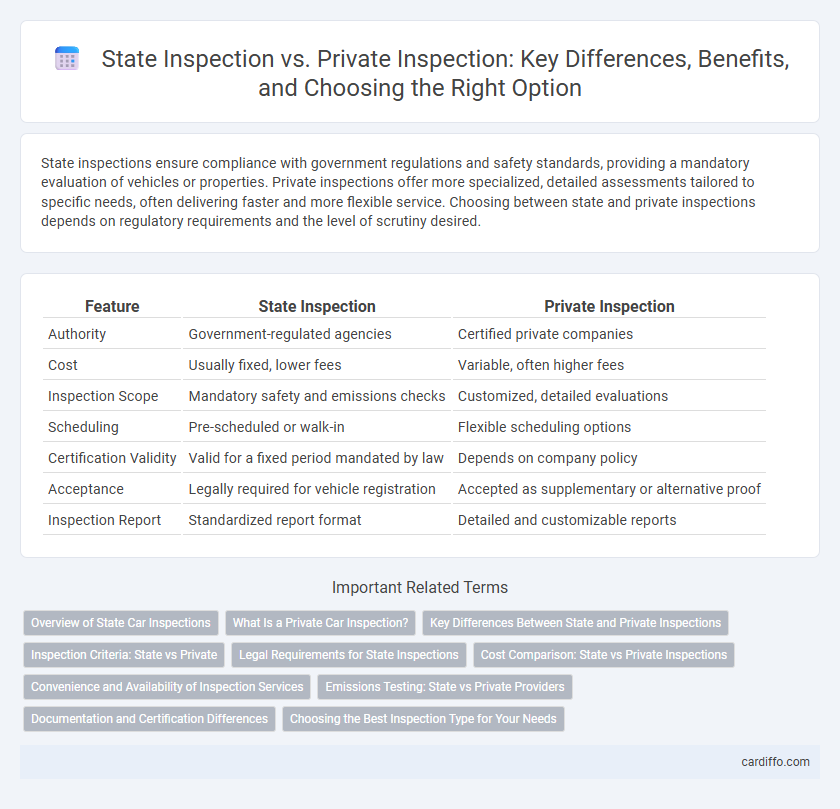State inspections ensure compliance with government regulations and safety standards, providing a mandatory evaluation of vehicles or properties. Private inspections offer more specialized, detailed assessments tailored to specific needs, often delivering faster and more flexible service. Choosing between state and private inspections depends on regulatory requirements and the level of scrutiny desired.
Table of Comparison
| Feature | State Inspection | Private Inspection |
|---|---|---|
| Authority | Government-regulated agencies | Certified private companies |
| Cost | Usually fixed, lower fees | Variable, often higher fees |
| Inspection Scope | Mandatory safety and emissions checks | Customized, detailed evaluations |
| Scheduling | Pre-scheduled or walk-in | Flexible scheduling options |
| Certification Validity | Valid for a fixed period mandated by law | Depends on company policy |
| Acceptance | Legally required for vehicle registration | Accepted as supplementary or alternative proof |
| Inspection Report | Standardized report format | Detailed and customizable reports |
Overview of State Car Inspections
State car inspections are mandatory evaluations regulated by government agencies to ensure vehicles meet safety and emission standards. These inspections often include checks on brakes, lights, tires, and exhaust systems, with results recorded in state databases to maintain public safety compliance. State inspections typically have standardized criteria and authorized inspection stations, distinguishing them from private inspections which may vary in scope and authority.
What Is a Private Car Inspection?
A private car inspection is a comprehensive evaluation of a vehicle conducted by an independent mechanic or inspection service rather than a government agency. It assesses the car's mechanical condition, safety features, and overall roadworthiness, providing detailed reports that help buyers make informed decisions. Unlike state inspections, private inspections often cover additional components such as engine performance, suspension, and potential hidden damages.
Key Differences Between State and Private Inspections
State inspections are typically mandated by law, ensuring compliance with government safety and environmental regulations, while private inspections offer customizable services tailored to specific client needs. State inspections often focus on standardized criteria and certifications, whereas private inspections provide more detailed reporting and specialized expertise. Costs for state inspections are usually fixed and lower, whereas private inspections can vary significantly based on scope and service provider.
Inspection Criteria: State vs Private
State inspections follow standardized, government-mandated criteria ensuring compliance with national safety, environmental, and regulatory standards. Private inspections often emphasize customized or industry-specific criteria tailored to client needs, sometimes exceeding baseline state requirements. The divergence in criteria impacts the scope, thoroughness, and reporting detail, with state inspections prioritizing public safety and legal adherence, while private inspections focus on specialized performance and risk assessments.
Legal Requirements for State Inspections
State inspections are governed by strict legal requirements that mandate compliance with safety, emissions, and regulatory standards to ensure public welfare. State inspection agencies must utilize certified inspectors and approved testing equipment to maintain consistent and legally defensible evaluations. Private inspections, while often thorough, may not be legally recognized for regulatory compliance, making state inspections essential for vehicle registration and legal accountability.
Cost Comparison: State vs Private Inspections
State inspections typically offer lower fees due to government subsidies and standardized pricing, making them a cost-effective option for vehicle owners. Private inspections, while often more expensive, provide faster service and greater scheduling flexibility, which can justify the higher cost for some consumers. Comparing costs, state inspections average around $20 to $50 whereas private inspections can range from $40 to over $100 depending on location and service scope.
Convenience and Availability of Inspection Services
State inspections often have limited operating hours and longer wait times due to high demand and bureaucratic procedures, affecting overall convenience for vehicle owners. Private inspections provide greater flexibility with extended hours, online booking options, and quicker turnaround times, improving accessibility and customer experience. Availability of private inspection centers is generally higher in urban areas, ensuring more convenient options for timely vehicle inspections.
Emissions Testing: State vs Private Providers
State inspections for emissions testing typically follow strict government-mandated protocols ensuring compliance with environmental regulations, utilizing calibrated equipment certified by environmental agencies. Private inspection providers often offer more flexible scheduling and faster turnaround times while maintaining adherence to state emissions standards through approved testing procedures. Both state and private facilities use advanced diagnostic tools to measure pollutants such as CO, NOx, and hydrocarbons, ensuring vehicles meet legal emissions limits to reduce air pollution.
Documentation and Certification Differences
State inspections typically provide standardized documentation and certification recognized by government authorities, ensuring compliance with legal and regulatory requirements. Private inspections often offer more detailed and customized reports tailored to specific client needs, but their certifications may not carry the same official weight or legal standing as state-issued certificates. Differences in documentation formats, scope of information, and certification validity are key factors distinguishing state inspections from private inspections.
Choosing the Best Inspection Type for Your Needs
State inspections ensure compliance with government regulations and are often mandatory for vehicle registration or property sales, providing a standardized assessment. Private inspections offer specialized services tailored to specific concerns, such as detailed structural analysis or advanced diagnostic technology, ideal for buyers seeking comprehensive evaluations. Choosing between state and private inspections depends on your requirements for regulatory compliance versus in-depth expertise and customization.
State inspection vs private inspection Infographic

 cardiffo.com
cardiffo.com